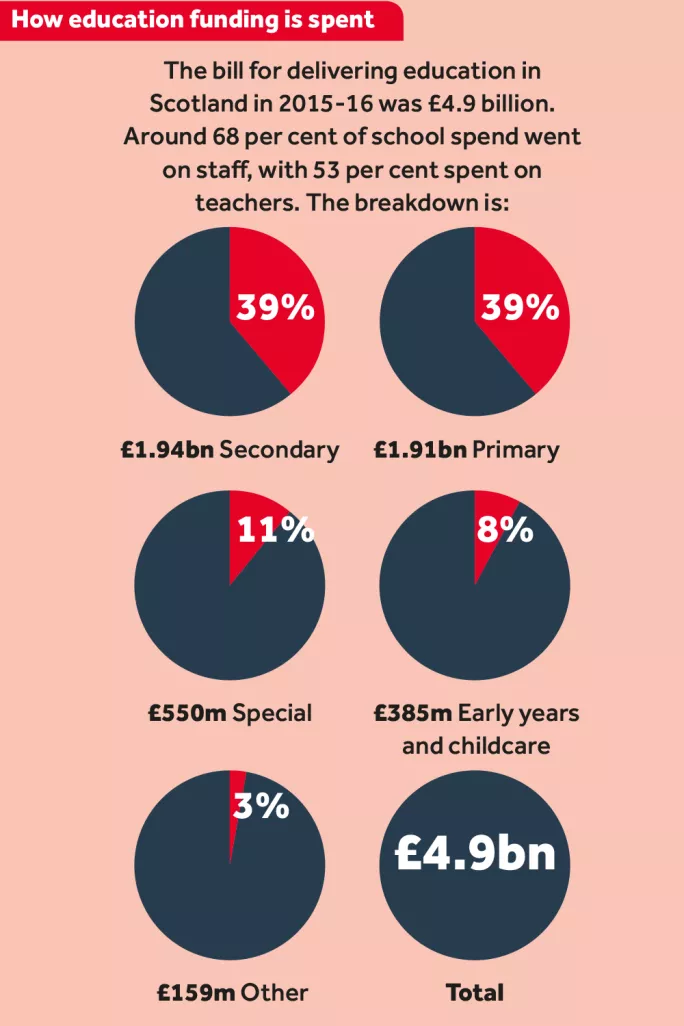Don’t ‘Anglicise’ Scottish education, says union

Scotland’s largest teaching union is warning the government it could be responsible for the “Anglicisation of Scottish education” and the creation of “academies-light” if it pushes ahead with plans to give headteachers more power and money.
The Scottish government has long ruled out introducing England’s academies system, which allows schools to opt out of council control and receive their funding direct from government. However, it has made it clear that it wants more decisions to be taken at school level and it believes the way funding is allocated to schools by councils currently is “complex, opaque, and varies widely between local authorities”. Now, however, the EIS teaching union is claiming the government “is in danger of creating schools with the same characteristics as academies”, in terms of reducing local-authority power and increasing headteachers’ powers, describing this prospect as “academies-light”.
‘No oversight’
The union also says the SNP’s proposals for how schools should be run and funded in the future “go beyond the powers that headteachers have in academies in England” because the government is considering “additional powers to headteachers and no governing body oversight”. The EIS warns that “bad governance” seen in the college sector - where one college’s senior management team was accused by a parliamentary committee convener of “an appalling abuse of the public purse” - could be repeated in schools.
If headteachers are given bigger budgets, the EIS is calling for “School Finance Committees” to be formed. These would draw their membership from the entire school community and relieve “headteachers of the solitary burden of making unilateral decisions”.

Council umbrella body Cosla, meanwhile, also says it has “serious concerns about accountability for public money if more power is to be devolved to headteachers”. It warns that there is a “real risk” the attainment gap will widen “by taking a school-based and not a whole-system approach to funding”.
“The school environment - however good - cannot ‘fix’ the environment in which some children live,” it says.
The EIS and Cosla made their warnings in their submissions to the government’s consultation on how schools should be funded in the future, which closed last month.
Tes Scotland has obtained exclusive access to the organisations’ responses to the consultation - as well as the responses submitted by primary and secondary headteachers’ organisations the Association of Headteachers and Deputes in Scotland (AHDS) and School Leaders Scotland (SLS).
The government makes the case for changing the way funding is allocated to schools by arguing that, under the current system, schools with similar characteristics in different local authority areas “may attract very different levels of funding”.
The government puts forward two alternatives: a Scotland-wide approach to devolving funding to headteachers to improve transparency and equity, and building on the Pupil Equity Funding (PEF) approach, which gives schools £1,200 for every child in P1 to S3 registered for free school meals to target “specific need factors known to impact on performance and outcomes” - although Tes Scotland last week highlighted concerns around PEF (“Headteachers ‘plug gaps’ with Pupil Equity Fund”, 27 October).
‘Unfit for purpose’
However, the EIS says it “does not agree that the government has provided a convincing rationale for change to the current funding structures”, and Cosla echoes this view. Both do concede, though, that the current system could be improved.
Responding to the EIS comments about the dangers of devolving more power and money to heads, Jim Thewliss, general secretary of SLS, said “nobody has any appetite for mirroring or duplicating the English system” and “no headteacher wants a situation where financial accountability is not in place”.
In its submission to the consultation, SLS calls the current arrangements for funding schools “irrelevant”, “opaque” and “unfit for purpose”. Mr Thewliss points out that there are 32 local ways of passing on funding to schools, and concludes that “there is neither equality nor equity at the point of delivery within Scotland or across local authority boundaries”.
Extending “the Pupil Equity Funding approach” would provide “transparent equality of resource provision across Scotland”, Mr Thewliss argued. However, SLS warns that if headteachers are to have more responsibility for budgets then a business manager would be needed for every school.
AHDS is also calling for more training and business manager support for headteachers if they are to be given bigger budgets, saying: “Until recently, headteachers have not had meaningful control of significant budgets.”
AHDS highlights the general “shortage of funding in schools at present”, adding that even the best system for devolving funding to schools “will not overcome this”.
A Scottish government spokesman said the consultation on school funding had attracted 94 responses. An analysis of those was being undertaken and the government will publish its response “in due course”, he added.
You need a Tes subscription to read this article
Subscribe now to read this article and get other subscriber-only content:
- Unlimited access to all Tes magazine content
- Exclusive subscriber-only stories
- Award-winning email newsletters
Already a subscriber? Log in
You need a subscription to read this article
Subscribe now to read this article and get other subscriber-only content, including:
- Unlimited access to all Tes magazine content
- Exclusive subscriber-only stories
- Award-winning email newsletters